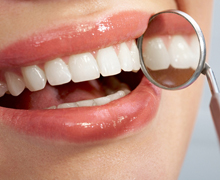
The customary recommendation from the dental community for people whose gums bleed easily is to increase their frequency of brushing and flossing to ward off or reverse early stage periodontal disease. While it may be gingivitis, a new study from the University of Washington School of Dentistry shows it could also be the result of low vitamin C levels in the bloodstream.
"When you see your gums bleed, the first thing you should think about is not, I should brush more," said the study's lead author Philippe Hujoel, a practicing dentist and professor of oral health sciences in the UW School of Dentistry. “You should try to figure out why your gums are bleeding. And vitamin C deficiency is one possible reason.”
Hujoel studied the results of 15 clinical trials from six different countries with more than 1,100 participants, as well as data from more than 8,200 people who took part in the U.S. Centers for Disease Control and Prevention’s Health and Nutrition Examination Survey. He discovered that bleeding of the gums when gently probed was associated with low vitamin C levels. And those who increased their vitamin C levels were able to reverse those bleeding issues.
Hujoel recommends people increase their intake of vitamin C through natural foods but if that’s not possible for some reason then they should supplement with tablets. "Vitamin C-rich fruits such as kiwis or oranges are rich in sugar and thus typically eliminated from a low-carb diet," he said.
Hujoel’s work on the subject is not the first regarding vitamin C deficiency and bleeding gums. In fact, he’s not even the first from the University of Washington to make the connection. The former dean of the UW School of dentistry, Paul Robertson, published the first of two studies 35 years ago.
Robertson identified bleeding gums as a biological marker for low vitamin C levels in a 1986 study and then followed that with more research in 1991. But somewhere along the line the focus shifted from vitamin C back to more of a traditional dental hygiene focus.
"There was a time in the past when gingival bleeding was more generally considered to be a potential marker for a lack of vitamin C,” Hujoel said. “But over time, that's been drowned out or marginalized by this overattention to treating the symptom of bleeding with brushing or flossing, rather than treating the cause."
